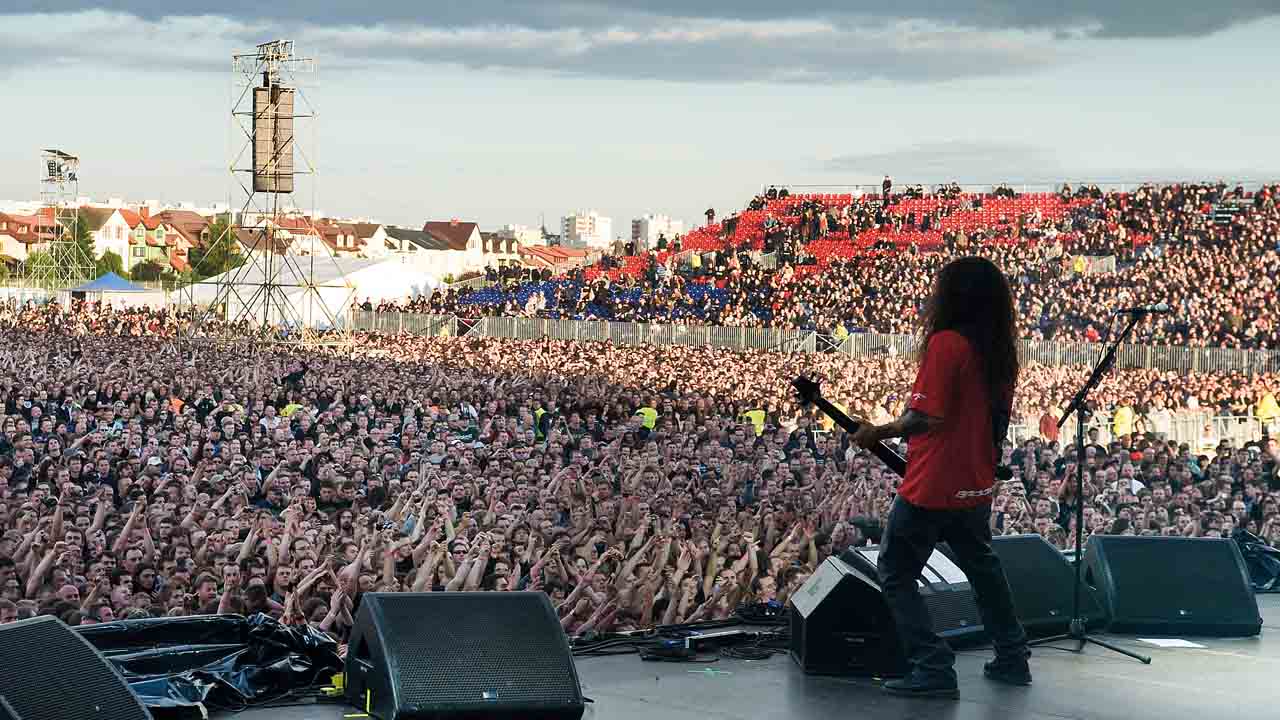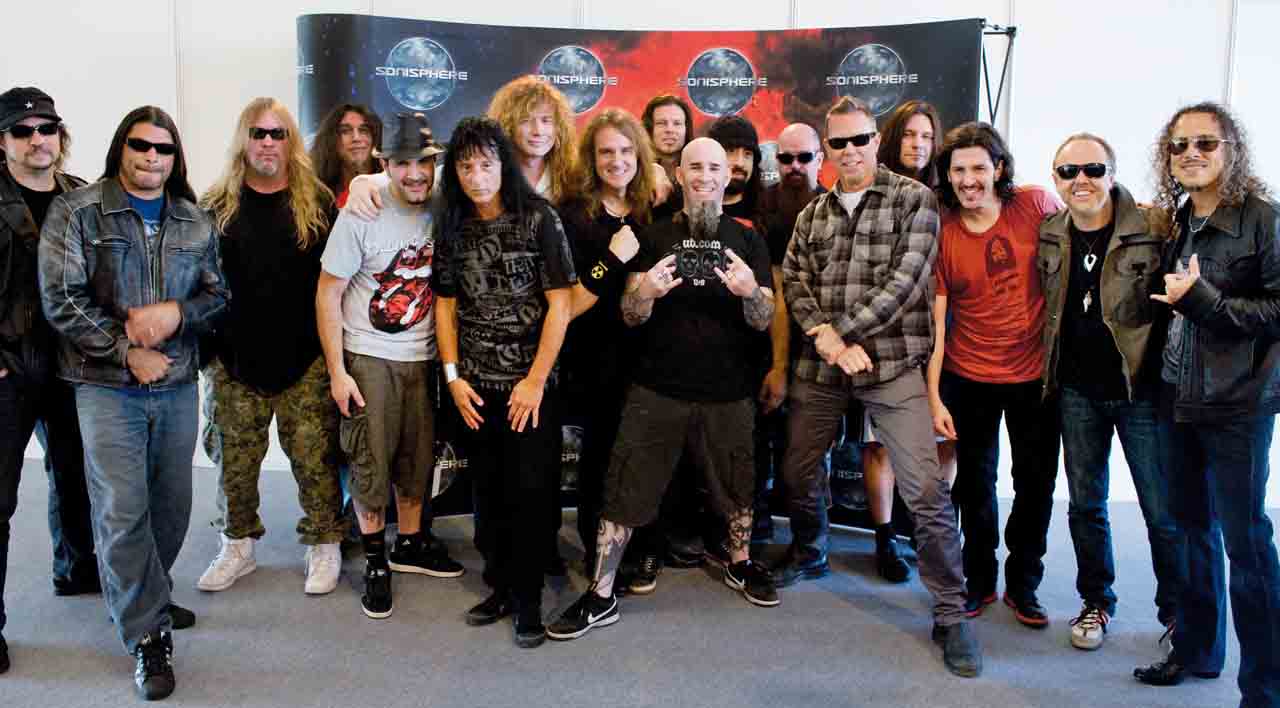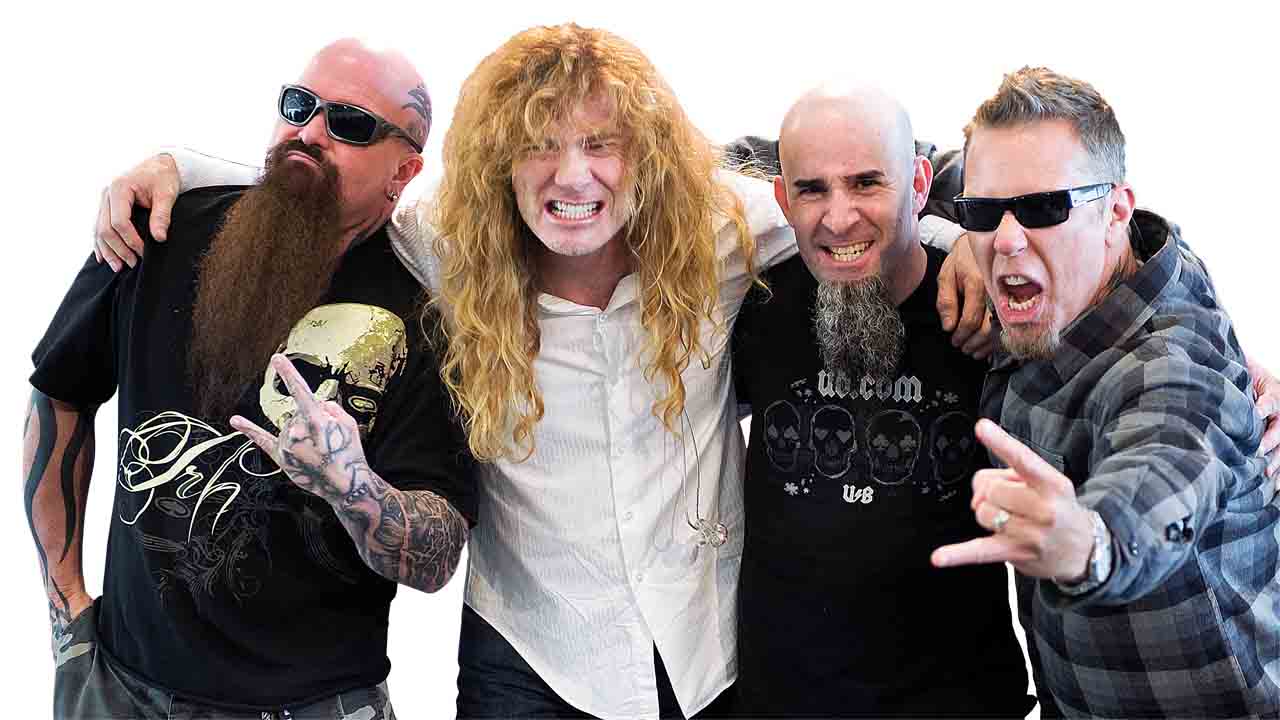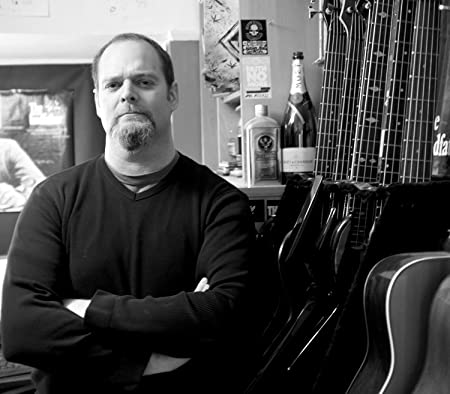There is no more metal place to be on Earth than here, today, standing on the runway of a vast airport complex in Poland, with the light of dusk turning everything orange. Megadeth’s Dave Mustaine is standing next to us, his copper locks mirroring the sun’s dying glow. To a soundtrack of equal parts Slayer and the demented screams of the 81,000 people they’re playing for, Megadave murmurs, “Y’know, I said some stuff in the past, and I’ve tried to make amends for it – and here we are, with all the bands that I’ve had disagreements with. We’re all lovey-dovey!” He shakes his head in disbelief and prowls off to chat with the ladies.
Dave isn’t the only one who can’t believe what’s happening. Twelve hours after Hammer left the UK and three after we arrived at the Sonisphere festival in the industrial outskirts of Warsaw, we can’t quite get it into our heads that we’re witnessing this stupendously important gig. As Scott Ian of Anthrax puts it, “I was sitting at a table with James [Hetfield] and Kirk [Hammett] last night. And James glances over and says: ‘Oh look, there’s Lars [Ulrich] boring the shit out of Dave.’ Lars and Dave are just chatting away to each other. And I said, ‘It’s kind of weird for me to even see them talking to each other, because the last time I saw that, Dave was still in Metallica!’ The energy was insane: we all kept saying to each other, ‘Can you believe we’re actually doing this?’ It’s really exciting…”
The scale of this thing is huge. There may only be a handful of dates Sonisphere successfully brought together the Big Four, but there’s a very real sense that history is being made. After all, the Big Four Of Thrash, as they were labelled in the late 1980s, have spent the last 20-plus years enduring drugs, deaths, stints in rehab, lineup shuffles and enough spins of the cruel wheel of fashion to finish off lesser acts – and yet they’re all here, older and mostly wiser, but with a renewed hunger that makes this show, their very first together, the only gig to see this year.
- Every Metallica album ranked from worst to best
- 1986: the inside story of the year that thrash metal exploded
- Slayer: The Making Of Reign In Blood
- 30 Essential thrash metal bands that aren't the big four
The atmosphere at the Polish Sonisphere is electric. Like medieval armies preparing for battle, the bands are staked out in two giant white tents. One of them belongs to Metallica, with a warm-up zone (the ‘Tuning Room’) attached; the other is shared by Slayer, Megadeth and Anthrax. There’s no elitism here, though: all the bandmembers troop freely in and around each other’s dressing rooms with only a modicum of security – probably because, unlike a UK or American event, there are very few PRs, fans, managers and other denizens lurking about backstage. Lurking near the free vodka stand, Hammer watches as the bands are whisked off in golf carts to the enormous stage, 200 metres away. It’s fascinating to see the machinery of a massive show like this one in action.
Poland’s very own death metal sensations Behemoth are opening the show, and frontman Nergal is obviously having trouble coming to terms with it. After his band’s 30-minute set, he tells us: “What can I say? I’m blown away! We’re honoured to be opening this show, especially in Poland. Usually stadium shows are tough for us, because we’re not an arena band, but I think our set went really well.” Has he met the stars of the show? “Yeah, Lars approached me – he was so friendly!” he nods. Asked if Behemoth received a planet-sized paycheque for their Sonisphere appearance, he says with great diplomacy: “We get a lot of satisfaction, ha ha! We would do it for free. Whatever happens in the future, we’ll always be a band who played with Metallica.”
Warmed up by Behemoth’s monstrous music, the Polish crowd give Anthrax the full welcome, greeting the opening chords of Caught In A Mosh with ear-splitting enthusiasm. We’re glad to see it, because this isn’t any old gig for the New York veterans: it’s nothing less than the start of a new era that could make or break them. After two years of chaos in which no one really knew who was singing for them, Anthrax have re-recruited their old frontman Joey Belladonna, who lent his expert wails to career-best albums such as Spreading The Disease and Among The Living. His reappearance seems to have rejuvenated the band, judging by today’s set – a quick 45-minute sprint through the highlights of Among… and classics like their version of Joe Jackson’s Got The Time. ’Thrax also deliver a few bars of Heaven And Hell in tribute to the late Ronnie James Dio, a nice touch which gets the crowd roaring with approval – even if the song Only gets a small number of fans shouting “John Bush” for a while.
In 1988 this show never would have happened. In 1998 no one gave a fuck. Now in 2010 it’s big fuckin’ news
KIrk Hammett
“This is huge for me!” grins Joey backstage, who reveals that he spent two hours in the crowd before the set, meeting fans. Guitarist Scott Ian adds: “John Bush decided that he didn’t want to be in the band – any band. He decided that this life is just not for him any more. Knowing that the Big Four shows were coming, it seemed to make sense that Joey did them, because it’s the lineup of the band that should be doing these shows. John just wasn’t able to commit to doing this full-time, which kinda made up our minds for us: we were like, ‘OK, let’s see if Joey wants to do this’. We flew him down to New York and hung out for two days, and it definitely felt good.”
Scott explains that the Sonisphere gigs represent a whole new chapter for Anthrax. “After last summer, when Dan Nelson walked, it really threw us into a downward spiral as a band: we’d never cancelled a tour before, for any reason. Nothing like that had happened in the history of this band. We were lucky enough that John came back and did the Knebworth Sonisphere and some gigs in Japan and Australia. I’d love to think that it was all meant to happen for a reason, and that Joey is back in the band to stay, and we’re gonna make a record and continue with this lineup. That’s what we all want to happen.” Fingers crossed…

Chilling backstage, Dave Mustaine is ready for his set. Megadeth are on fire at the moment, as anyone who saw them at Download can testify, and the popularity of their 2009 album Endgame – Dave’s most aggressive and technical in years – says much about the public’s affection for thrash metal in 2010. Boosted by the re-recruitment of bassist David Ellefson, Megadeth are close to the peak of their powers – although Dave knows that he’s screwed up, and screwed up badly, in the past.
Chatting candidly to Hammer, he shrugs: “This is historic for plenty of reasons. There are so many happy people standing out there in the audience. There might be others who are saying, ‘Fuck you Dave, I hate you.’ But at the end of the concert it’s like, ‘You know what? I had a good time.’ I’m not even the slightest bit concerned about the people who don’t like me. I’m concerned about the people that do!”
Asked if he’d been uneasy opening for Slayer, a band of roughly equal stature to Megadeth, Dave explains: “No – I think that’s because Slayer have been together for considerably longer, with less lineup changes.” He adds, “This is really neat for me, because I’m the only one that’s been in two of the bands. Last night we were having dinner and Lars and I sat at the same table and we were shooting the shit all night. James and I are friends. So many people are Metallica fans, and they’re missing out on Megadeth because they think we don’t get along. Megadeth make good music, so I really think they should give us a fair shot.”
Judging by the Polish crowd’s reaction, a lot of people are willing to do just that, with their appreciation for new ’Deth songs such as Head Crusher just as great as for classics like Symphony Of Destruction. Backstage, Kerry King of Slayer is listening to Megadeth’s set while talking to Hammer, telling us: “I think Megadeth had a fuckin’ great last record – those are great riffs! Metallica’s making heavy fuckin’ music too. Now is a good time for this tour.”
Kerry, who Kirk Hammett later describes to us as “so fuckin’ metal”, did what he does best on arrival in Poland the previous night, arriving at the dinner organised by Metallica in party mood. “It felt pretty historic to me yesterday,” he informs us. “It was awesome. I was sitting at the table with Shawn Drover from Megadeth and I looked up and said, ‘Dude, there’s a lot of famous fuckin’ people here!’ The first guy I saw was Ellefson, then I was hanging out with Kirk and Scott, and then I had Shawn and Chris [Broderick] from Megadeth with me for most of the night – and then me and Kirk started doing shots, and it escalated from there. It was a fuckin’ blast!”
If anyone could realistically outplay the headliners tonight, you’d have to nominate Slayer, whose hour-long set is mesmerising. “I put together a brutal set,” promises Kerry beforehand, and indeed the LA quartet’s warp-speed dash through the classics (Angel Of Death, Chemical Warfare and the apocalyptic set-closer Raining Blood) and new material (Jihad, World Painted Blood) is worth coming a long way to see. Slayer epitomise metal, right down to their old-school musical preferences: as Kerry tells us, “I saw a poster in town saying that Venom’s playing here soon – and I was like, ‘Fuck! Why couldn’t they play on this thing?’”

And so to Metallica, the biggest heavy metal band there has ever been or, indeed, there is ever likely to be. The four support acts have done their stuff and retired to their tour buses, as the long drive to the next Sonisphere in Switzerland prevents much backstage debauchery. The scene is set, the sun has gone down, and oh God, is that the beginning of The Ecstasy Of Gold? With 81,000 people bellowing the M-word, we slam our vodka and run to the front of the stage…
“You know something?” Kirk Hammett told Hammer earlier that afternoon. “In 1988 this show never would have happened, for whatever reason. In 1998 no one gave a fuck, and now in 2010 it’s big fuckin’ news. God fuckin’ bless it! It was initially James’s idea. He just wondered one day how great it would be if the Big Four toured together, and we all kinda scratched our heads in agreement and were all like, ‘Yeah, that would be very, very cool.’”
I was sitting at a table with James Hetfield and he says, ‘Oh look, there’s Lars boring the shit out of Dave Mustaine.’
Scott Ian
Talking about the previous night’s get-together, Kirk says: “It was at an Italian restaurant here in Warsaw, and everyone was hanging out until one or two in the morning. We were all very happy to be here: the main topic was how great it was that we were able to pull this off, and how great it was to be still standing 25 years after the fact. We were just bouncing around and catching up. It was just the bands – no girlfriends or managers. It was hilarious, because it could easily have been 1985: we have a lot less hair but a lot more experience!”
The question we had to ask – about whether the bad blood that has existed between some of the musicians for decades is still causing resentment – didn’t take Kirk by surprise. “I’m a man of integrity and sincerity, and I believe in karma,” he told us, “and I don’t let anything like that bother me. There are more important things in life, and I don’t let myself get all riled up about who said whatever. I have a pretty good concept of myself, so I never let any of that shit fuckin’ bother me at all. You’ll never see me replying to any bullshit, I’ve never bothered. I don’t have time for any of that fuckin’ crap. We all collectively know that that was the past, and this is now, and what is happening is what is happening. This is the show to see for metal fans.”
This view seems to be shared by the vast audience tonight: when the unmistakable opening chords of Creeping Death hit the crowd, accompanied by 20-foot pyro eruptions, the idea of being anywhere else at this precise moment is unthinkable. The 15 songs in the main set come from the earliest days of thrash metal – The Four Horsemen and Master Of Puppets among them – via Metallica’s MTV-dominating early 90s (Sad But True sounds vast), but the band skip lightly over the Load, Reload and St Anger era, with only Fuel representing those “sideways journeys” as Kirk refers to them in our interview. Three Death Magnetic songs bring the set up to date, but the encores seal the deal: Metallica’s 1990 cover of Queen’s Stone Cold Crazy, followed by their first ever song, Hit The Lights, and the quintessential thrash anthem, Seek And Destroy. It’s a breathtaking spectacle.
And maybe, just maybe, you’ll be seeing it too. You’re reading it here first: if this run is a success (and why wouldn’t it be?), the Big Four shows may take place in other countries. Kirk tells us, “If this works out, and everyone has the time, there’s no reason why we can’t do this again in the future. This is basically the trial run.” Kerry King adds, “I’m hoping this grows some big fuckin’ legs and gets to Western Europe, the UK and the rest of the world. I told James last night, ‘Dude, I think this is going to be such a big thing – hopefully we can take it everywhere’… If it all works out, I can’t imagine why it wouldn’t go everywhere else.”
An interesting thing happens at the end of Metallica’s set. After the final encore, the band are throwing drum- sticks and guitar picks into the crowd when some moron in the control booth sends a recorded message through the PA system. As a giant, disembodied voice talks to the crowd in Polish, James Hetfield barks into his microphone, “Shut the fuck up! We ain’t finished yet!” The stadium erupts in applause.
He’s right, too. Metallica aren’t finished yet. Thrash metal is alive and well, and your life is better because of it.
Published in Metal Hammer #208

